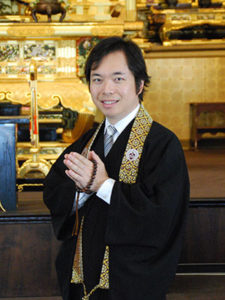
Rev. Masanari Yamagishi, temporarily assigned to Hawaii Betsuin as of April 2020
Submitted by Rev. Masanari Yamagishi
Shinran Shonin wrote the Hymns to easily teach us Buddhism. He wrote about 500 of them. Because of Shinran’s teaching, we are able to know and learn the teaching of the sutras, and Buddhism could spread more around the world. Even today, we chant 6 parts of Hymns with the Shoshinge in every morning at Hawaii Betsuin.
One of my favorite Hymns is the following,
Such is the benevolence of Amida’s great compassion,
That we must strive to return it, even to the breaking of our bodies;
Such is the benevolence of the masters and true teachers,
That we must endeavor to repay it, even to our bones becoming dust.
This Hymn is used as the lyrics of the gatha “Ondokusan.” I like this song, and am always thankful for the meaning of it.
Amida’s compassion is to save all people absolutely and to bring them to the Pure Land. Shakyamuni Buddha, the Seven Masters, Shinran Shonin, and many other people who have been born in the Pure Land are teaching the truth of compassion to us. We don’t know how to express our gratitude to them. We can’t thank them enough. This is the meaning of the expression, “even to the breaking of our bodies” and “even to our bones becoming dust.”
The Ondokusan tells us how Amida’s compassion is larger than we can even imagine. We have to have gratitude for Amida and those who have been born in the Pure Land, like Shinran Shonin and the Seven Masters. To put it very simply, it is to say the Nembutsu, Namo Amida Butsu. When we sing the Gatha “Ondokusan,” let us remember the meaning of this beautiful Hymn.
Thank you.
In Gassho


